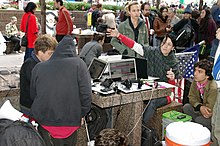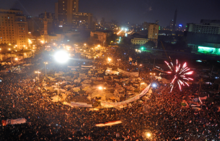User:Jduden/sandbox
| This article was the subject of an educational assignment. Further details were available on the "Education Program:Drake University/Global Youth Studies (Spring 2013)" page, which is now unavailable on the wiki. |
Media activism
[edit]Media activism utilizes media and communication technologies for social and political movements. Methods of media activism include publishing news on websites, creating video and audio investigations, spreading information about protests, and organizing campaigns relating to media and communications policies.

Media activism is often employed by grassroots activists and anarchists to spread information not available via mainstream media or to share censored news stories[1]. Certain forms of politically motivated hacking and net-based campaigns are also considered media activism. Often, the focus of media activism is to change policies relating to media and communications[2].
Social media is often used as a form of media activism. Because of the interactive features and widespread adoption users can quickly disseminate information and rally supporters [3]. Platforms like Facebook and Twitter can reach a much larger audience than traditional media. Although often only a small percentage of people who express interest in a cause online are willing to commit to offline action, social media interaction is viewed as "the first step in a ladder of engagement" [4]. Culture jamming, another form of media activism, is a subversive strategy of protest that re-appropriates the tropes of mainstream media "in order to take advantage of the resources and venues they afford" [5].
Media activism has expanded its scope to include fields of study such as journalism and news media[6]. Media Activism additionally educates the audience to be producers of their own media. Media activism to be expanded to facilitate action through media production and involvement[7].
Case studies
[edit]Social Media has become a primary organizing tool for political and social movements globally[8]. They serve to strengthen already existing networks of political and social relationships among activists offline [9].
Venezuela
[edit]Media activism in Venezuela has been used recently during the re-election campaign of President Hugo Chávez and the 2013 presidential campaign between Nicholás Maduro and Enrique Capriles.
Today nearly 32 percent of Venezuelan internet-users utilize social media on regular basis [10].
Social media worked as a mode of communication for rallies and political platforms, thus operating as a form of a media activist society and pulling substantial weight in the Chavez election[11][12]. Media activism connected most dominantly in the Venezuelan youth population--a generation considered most savvy with the progression of media[12].
Internet access and social media use are important indicators and resources to media activism. Media activism in this instance can be interpreted by the rise in participation in media, where social media could dramatically change how and how much young people engage politically, especially in voting[13]. The re-election of Chavez was strongly impacted by such media participation, in turn making it relevant to Venezuelans and their dedication to media activism civically.
The Arab Spring Uprising
[edit]
The 2011 Arab Spring uprisings made extensive use of social media activism within the countries of Tunisia, Libya and Egypt. These nations concentrated on the ability of the society to operate social media and begin organizing a grassroots initiative for a globalized form of democracy[14].
Egyptian protesters utilized social media to reduce the difficulties and cost associated with organizing rallies and a readily-mobilized political force[15]. This facilitation of assembly through social media allowed the creation of new gateways for civic engagement where Egypt had suppressed such opportunities under emergency power for the last 30 years[15]. This facilitation of assembly through social media allowed the creation of new gateways for civic engagement where Egypt had suppressed such opportunities under emergency power for the last 30 years [15]. This uprising led to violent conflict within each of the nations, and can thus media and media activism can be viewed as a fundamental contributor to the nation's new national identity under a new rule[14].
China
[edit]China has strong censorship laws in place, where the press freedoms are not considered free, rather oppressive but improving[16]. Youth in China have worked towards stronger press freedoms online and a dedication to utilizing the principles of media activism[17]. Intensive civic conversation occurs online in China[17]. Youth have critiqued the government through what came to be known as "the River Crab critique," in turn spurring civic conversation on the internet. Media Activists in China used their online presence and freedom to alter images, such as Marilyn Monroe, to have the face of Chinese Communist leader Mao. This image was coined as Maorilyn Maoroe, which in the image is juxtaposed next to a homophone for profanity. "Maorilyn Maoroe" was an opponent to the societal River Crab, which is a pun on "harmonious," a principle that Chinese censorship was created to promote, but has failed to do so [18].
In China, youth and other media activists have discovered and utilized new methods to indirectly criticize the political and societal environments, going around the government censorship. Social media is among the newest method of critique. Activists use "microblogs" to critique the government [19]. Blogging can therefore be seen as a media activist approach to civic participation within the bounds of government censorship.
Suppression of Media Activism
[edit]States such as North Korea, Venezuela, and China have attempted to curtail media activism through a variety of tactics. The Chinese state engages in media censorship in the name of national harmony, although the Council on Foreign Relations argues that suppression of online activism is to protect authorities' political or economic interests[20] . In North Korea, the state curtails virtually all forms of digital communication, but a few transnational citizen-journalists have used technology like cell phones and thumb drives to communicate accurate news to citizens and abroad.[21]
The Role of Youth in Media Activism
[edit]Media activism among youth can be linked to the way youth protest and create communities online over specific issues and social connections [22]. Youth are getting involved more and more today, especially in the political spectrum through social media. It is seen that youth who choose to engage in political participation were two times as likely to vote than those who were not involved at all, in turn supplementing political activity rather than replacing it[13]. This is media activism because, through social media, the youth population are changing their identities by "opening" societies through social media in places where governments are otherwise repressive[23]. If there is a lack of internet access, or there is a lack of education among youth[23]. Youth can be seen as the future of media activism, as it is anticipated in the years to come.
References
[edit]- ^ Kim Deterline. "FAIR's Media Activism Kit". Retrieved December 19, 2012.
- ^ Andors, Ph.D., Ellen (2012). The Task of Activist Media. Peoples Video Network.
- ^ Ed Carrasco (March 26, 2012). "How Social Media Has Helped Activism". New Media Rockstars. Retrieved December 19, 2012
- ^ Sarah Kessler (October 9, 2010). "Why Social Media Is Reinventing Activism". Mashable. Retrieved December 19, 2012
- ^ Christine Harold (September 2004). "Pranking Rhetoric: "Culture Jamming" as Media Activism". Critical Studies in Media Communication 21 (3 ed.). pp. 189–211. Retrieved December 19, 2012
- ^ "Media Activism". Burlington College. Retrieved 13 May, 2013.
{{cite web}}: Check date values in:|accessdate=(help) - ^ http://centerformediajustice.org/toolbox/
- ^ Shirky, Clay. "The Political Power of Social Media". Council on Foreign Relations. Retrieved 14 May 2013.
- ^ Poell, Thomas. "Twitter as a multilingual space: The articulation of the Tunisian revolution through #sidibouzid". NECSUS. Retrieved 14 May 2013.
- ^ Golinger, Eva. "Internet Revolution in Venezuela | venezuelanalysis.com". venezuelanalysis.com | Venezuela News, Views, and Analysis. Retrieved 26 Mar. 2013
- ^ Rohlinger, Deana A., and Jennifer Earl. Media, Movements, And Political Change. Bingley, U.K.: Emerald, 2012. eBook Collection (EBSCOhost). Web. 2 May 2013
- ^ a b Forero, Juan. "Venezuelan youth could decide if Chavez remains in power". Washington Post. Retrieved 14 May 2013.
- ^ a b Kahne, Joseph Middaugh, Ellen (2 May 2013). "Digital Media Shapes Youth Participation In Politics". Phi Delta Kappan. 94 (3): 52. doi:10.1177/003172171209400312.
{{cite journal}}: Check date values in:|year=/|date=mismatch (help)CS1 maint: multiple names: authors list (link) - ^ a b Khan, A. A (2012). "THE ROLE SOCIAL OF MEDIA AND MODERN TECHNOLOGY IN ARABS SPRING". Far East Journal of Psychology & Business. 7 (1): 56–63.
- ^ a b c Pfiefle, Mark. "Social Media and Political Activism". The Huffington Post. Retrieved 14 May 2013.
- ^ Cook, Sarah. "China". Freedom House. Retrieved 14 May 2013.
- ^ a b New Media Practices in China: Youth Patterns, Processes, and Politics. International Journal of Communication. 2011. pp. 406–436.
{{cite book}}:|first=missing|last=(help) - ^ R.L.G.. "Chinese censorship: Fǎ Kè Yóu, River Crab | The Economist." The Economist - World News, Politics, Economics, Business & Finance. The Economist, 7 June 2011. Web. 14 May 2013. <http://www.economist.com/blogs/prospero/2011/06/chinese-censorship>
- ^ Mead, Walter. "Social Media Endangers and Empowers China’s Activists | Via Meadia." The American Interest Magazine - Policy, Politics & Culture. The American Interest, 5 Mar. 2013. Web. 3 May 2013. <http://blogs.the-american-interest.com/wrm/2013/03/05/social-media-endangers-and-empowers-chinas-activists/>
- ^ Bennett, Isabella. "Media Censorship in China". Council on Foreign Relations. Retrieved 14 May 2013.
- ^ Boynton, Robert (February 2011). "North Korea's Digital Underground". The Atlantic.
{{cite web}}: CS1 maint: date and year (link) - ^ Wolf, Linda (2001). Global Uprising: Confronting the Tyrannies of the 21st Century : Stories from a New Generation of Activists. New Society Publ.
- ^ a b Khashaba, Karim. "Facebook: virtual impact on reality in the Middle East | openDemocracy". openDemocracy. Retrieved 2 May 2013.

